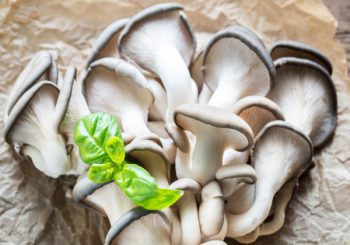By Sayer Ji
Contributing writer for Wake Up World
Oyster mushrooms stand out among fungi species for their fan-shaped, oyster-like caps. Not only do oyster mushrooms resemble oysters, but their mild flavor is seafood-like and somewhat nutty. In the wild, you can find oyster mushrooms growing on decaying wood such as beech and aspen trees.[i] While they grow year-round, they’re most likely to fruit in mild weather after rain and sometimes release so many spores that they appear to “smoke.”[ii]
[pro_ad_display_adzone id=”110028″]
Native to Europe, North America and Asia, oyster mushrooms have been enjoyed since ancient times and in 1775 were first recorded by a Dutch naturalist.[iii] Now widely cultivated, oyster mushrooms come in a range of colors, including gray, blue, yellow, pink and white, which is why they’re sometimes called “designer mushrooms.”[iv]
The term oyster mushroom actually describes a number of different fungi species in the Pleurotaceae family, with Pleurotus ostreatus being among the most common. Also intriguing, oyster mushrooms are considered carnivorous, as its mycelium, or network of fungal cells, kills and eats nemotodes, a type of parasitic worm. For this reason, oyster mushrooms are being considered for natural pest control to prevent nematode-related plant diseases.[v]
With their delicate, savory anise flavor, oyster mushrooms can be enjoyed in a range of dishes, from stir-fries and soups to sauces and egg dishes. They’re also sometimes featured in vegan “calamari.” While taste is the first reason why many choose oyster mushrooms for culinary uses, these mushrooms also have an impressive roster of health benefits that’s worthy of your attention.
21 Reasons to Eat Oyster Mushrooms
Medicinal mushrooms, as a whole, are among the healthiest foods you can eat, but each mushroom variety has unique beneficial effects. Rich in dietary fiber, minerals, vitamin B and protein,[vi] there are at least 21 pharmacological actions that have been attributed to oyster mushrooms, which you can explore in-depth at GreenMedInfo.com. This includes:
1. Bone protection
When oyster mushrooms are fermented by gut microbiota, it leads to favorable alterations that enhance the activity of osteoblasts, or bone-forming cells.[vii]
2. Antioxidants
Oyster mushrooms are rich in antioxidant polysaccharides, helping to protect against oxidative damage.[viii] One type of these polysaccharides, beta glucans, which are known for their antioxidant and anticancer activities, also increase the activity of enzymes that promote xenobiotic detoxification.
Via this beneficial effect, they’re able to protect against the harmful effects of acrylamide, a neurotoxic and possibly carcinogenic compound formed during high-temperature cooking.[ix]
3. Blood sugar reduction / Antidiabetes effects
Oyster mushrooms, consumed for two seven-day periods during a 24-day study, significantly reduced blood sugar, blood pressure, triglycerides and cholesterol in people with diabetes, without any negative effects on the liver or kidneys.[x]
4. Immune system support
Among children with frequent respiratory tract infections, those treated with a syrup containing beta-glucans from oyster mushrooms and vitamin C had fewer infections than those treated with vitamin C only.
Specifically, 36% of the children given beta glucans were free from respiratory infections during the study period, compared to 21% in the placebo group. Not only did the beta glucan significantly reduce the number of lower respiratory tract infections, but it also significantly decreased the frequency of flu and flu-like disease and modulated humoral and cellular immunity, revealing “complex immunomodulatory activity … “[xi]
5. Anticancer effects
In addition to beta glucans, oyster mushrooms are a “reservoir of macromolecules,” including resveratrol, concanavalin A, cibacron blue affinity protein, p-hydroxybenzoic acid, ergosterol and others, which play antitumor, immunomodulatory and antioxidant roles that may help fight cancer.
Oyster mushrooms’ unique combination of polysaccharides, proteoglycans and polypeptides may be so immune-enhancing that they could “overcome the limitation of traditional cancer therapies.”[xii]
6. Liver protection
Phosphorylated polysaccharide from oyster mushrooms protected the liver from chemical-induced injury in an animal study, revealing strong hepatoprotective and antioxidant effects.[xiii] Oyster mushroom extract has shown similarly protective effects in alleviating chemical-induced liver damage in animals.[xiv]
15 More Reasons to Eat Oyster Mushrooms
If you’re looking for more reasons to add oyster mushrooms to your regular meal rotation, consider that they’ve been researched for at least 30 conditions, including cancer, diabetes, respiratory infections and aging. Here are 15 more of the mechanisms behind their varied health-boosting effects:[xv]
|
7. Gastrointestinal agent |
8. Apoptotic |
9. Antiproliferative |
|
10. Antibacterial |
11. Cardioprotective |
12. Cell cycle arrest |
|
13. Chemopreventive |
14. Detoxifier |
15. Osteogenic |
|
16. Cholesterol lowering agent |
17. Antifungal |
18. Caspase-3 activation (anticancer) |
|
19. Caspase-9 activation (anticancer) |
20. P21 activation (anticancer) |
21. Tumor suppressor protein p53 upregulation, yielding potential therapeutic and preventive effects on breast and colon cancers |
For the Best Flavor, Grow Your Own
Mushrooms are a nourishing tonic for humans and the environment, and oyster mushrooms in particular are regarded as both a “health promoter and environmental restorer.”[xvi]
This is because, as they grow, they break down toxins from the environment, removing and neutralizing them. These versatile mushrooms have been found to reduce bacteria like E. coli while also breaking down hydrocarbons[xvii] and remediating heavy metals.[xviii]
Growing mushrooms is, therefore, one of the only economical biotechnologies that, as noted by Ethiopian researchers, “combines the production of protein?rich food with the reduction in environmental pollution.”[xix] It’s surprisingly simple to grow mushrooms at home, and a number of kits are available to get you started.
Growing your own mushrooms not only provides you with the freshest mushrooms you can find, but they’ll taste better too — and you won’t have to worry about identifying mushrooms in the wild, a crucial step since some wild mushrooms are poisonous.
As noted by the Missouri Department of Conservation, “Considered a choice edible, wild oyster mushrooms have a much better flavor than the cultivated oyster mushrooms found at most grocery stores … growing oyster mushrooms at home … [is] educational, fun, and provide[s] healthful food for the table.”[xx]
References:
[i] Specialty Produce, Oyster Mushrooms https://www.specialtyproduce.com/produce/Oyster_Mushrooms_703.php
[ii] Missouri Department of Conservation, Oyster Mushroom https://mdc.mo.gov/discover-nature/field-guide/oyster-mushroom
[iii] Specialty Produce, Oyster Mushrooms https://www.specialtyproduce.com/produce/Oyster_Mushrooms_703.php
[iv] Mycological Society of San Francisco, Oyster Mushrooms https://www.mssf.org/cookbook/oyster.html
[v] Missouri Department of Conservation, Oyster Mushroom https://mdc.mo.gov/discover-nature/field-guide/oyster-mushroom
[vi] Food Sci Nutr. 2017 Sep; 5(5): 989-996. https://www.ncbi.nlm.nih.gov/pmc/articles/PMC5608979/
[vii] Food Funct. 2021 Mar 1;12(4):1529-1546. doi: 10.1039/d0fo02581j. www.greenmedinfo.com/article/fermentation-pleurotus-ostreatus-and-ganoderma-lucidum-mushrooms-and-their-ext
[viii] Food Chem. 2020 Nov 15;330:127173. doi: 10.1016/j.foodchem.2020.127173. Epub 2020 May 29. www.greenmedinfo.com/article/obtaining-extracts-rich-antioxidant-polysaccharides-edible-mushroom-pleurotus-
[ix] Nutr Hosp. 2020 Aug 27;37(4):850-854. doi: 10.20960/nh.03001. https://pubmed.ncbi.nlm.nih.gov/32686446/
[x] Mymensingh Med J. 2007 Jan;16(1):94-9. doi: 10.3329/mmj.v16i1.261. https://pubmed.ncbi.nlm.nih.gov/17344789/
[xi] Int Immunopharmacol. 2013 Feb;15(2):395-9. doi: 10.1016/j.intimp.2012.11.020. Epub 2012 Dec 20. https://pubmed.ncbi.nlm.nih.gov/23261366/
[xii] Int J Biol Macromol. 2021 Jul 1;182:1628-1637. doi: 10.1016/j.ijbiomac.2021.05.102. Epub 2021 May 19. https://pubmed.ncbi.nlm.nih.gov/34022311/
[xiii] Int J Biol Macromol. 2020 Nov 1;162:533-547. doi: 10.1016/j.ijbiomac.2020.06.107. Epub 2020 Jun 18. www.greenmedinfo.com/article/structural-characterization-phosphorylated-pleurotus-ostreatus-polysaccharide-
[xiv] Food Chem Toxicol. 2006 Dec;44(12):1989-96. Epub 2006 Jul 12. PMID: 16914248 www.greenmedinfo.com/article/oyster-mushroom-pleurotus-ostreatus-alleviates-chemically-induced-liver-damage
[xv] GreenMedInfo.com, Oyster Mushroom, Pharmacological Actions www.greenmedinfo.com/substance/oyster-mushroom
[xvi] Food Sci Nutr. 2017 Sep; 5(5): 989-996. https://www.ncbi.nlm.nih.gov/pmc/articles/PMC5608979/
[xvii] Permaculture February 5, 2015 https://www.permaculture.co.uk/readers-solutions/using-fungi-clean-pollutants
[xviii] Bioresour Bioprocess. 2017; 4(1): 32. https://www.ncbi.nlm.nih.gov/pmc/articles/PMC5504202/
[xix] Food Sci Nutr. 2017 Sep; 5(5): 989-996. https://www.ncbi.nlm.nih.gov/pmc/articles/PMC5608979/
[xx] Missouri Department of Conservation, Oyster Mushroom https://mdc.mo.gov/discover-nature/field-guide/oyster-mushroom
Recommended Articles by Sayer Ji:
- The Power and Mystery of Melanin Explained
- Cell Phone Induced Bodily Harm: How the Bees Can Help
- The Spice That Prevents Fluoride Destroying Your Brain
- How to Clean Your Arteries with One Simple Fruit
- 7 Healing Uses for Lavender Essential Oil
- From Table to Tomb: Cumin’s Health Benefits Rediscovered
- Why You Should Ditch Sugar in Favour of Honey
- The Love Affair Between Saffron and Humanity: As Ancient as Time Itself
- Why Walnut Resembles the Brain It Nourishes
- Magnesium Puts Psychiatric Drugs to Shame for Depression
About the author:
Sayer Ji is the founder of Greenmedinfo.com, a reviewer at the International Journal of Human Nutrition and Functional Medicine, Co-founder and CEO of Systome Biomed, Vice Chairman of the Board of the National Health Federation, and Steering Committee Member of the Global Non-GMO Foundation.
© 2020 GreenMedInfo LLC. This work is reproduced and distributed with the permission of GreenMedInfo LLC. Want to learn more from GreenMedInfo? Sign up for their newsletter here.
[pro_ad_display_adzone id=”110027″]








